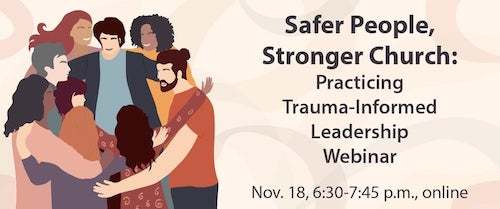
Trauma-Informed Leadership
We live in a fearful and hurting world. A world where our individual pain swells into a collective trauma. Trauma comes from the Greek word for “wound”. Traumas can take many forms for different people. As faith communities, we are called to nurture healing and hope. Can the church become a buffer zone for those who have experienced trauma? How can leaders become trauma-informed? How can a church become trauma-responsive? How can the church be a place of safe place of healing for those who have experienced trauma when the church has contributed to trauma?
To help equip leaders to navigate the challenging, yet hopeful, terrain of answering these questions, the Dakotas-Minnesota Area will be offering a webinar entitled, Safer People, Stronger Church: Practicing Trauma-Informed Leadership Webinar on Nov. 18, 6:30-7:45 p.m.
"Trauma-informed leadership begins with the honest acknowledgment that we are all shaped by our stories.... some beautiful, some broken,” shared Bishop Lanette. “It’s the understanding that pain, when left unattended, becomes the place from which we lead, speak, and make decisions. But when pain is named, tended, and healed, it becomes wisdom.”

Trauma-informed leadership development has become an area of focus for United Methodist clergy and leaders across the Area.
“As leaders, we carry both our own wounds and the collective wounds of the communities we serve. Trauma-informed leadership asks us to pause before we react, to listen beneath behavior for the story, and to create spaces of safety and trust where healing can take root. It is not about fixing others...it is about cultivating awareness, empathy, and grace in the systems we shape and the souls we steward,” explained Bishop Lanette.
Diane Owen, Dakotas-Minnesota Area director of clergy well-being, uses her role to encourage clergy to engage, understand, and heal from their own trauma as an essential step before clergy can help others heal.
“Basic elements of well-being (sleep, exercise, nutrition, mindfulness, mental health, and healthy relationships) are essential to begin the healing process,” said Owen. “Only then am I better prepared to become a trauma-informed leader, helping our church become a buffer for others who have experienced harm and trauma.”
This work is important and foundational to all who seek to bind up the wounds of others. Bishop Lanette, along with Owen and the entire Cabinet, are encouraging all clergy to begin or continue their journey in becoming a self-aware, trauma-informed leader.
Dakotas Cabinet dean, Rev. Kris Mutzenberger, values the indivudual perspective each of us brings to the conversation. "Trauma affects all of us in different ways. Taking steps to begin to learn about trauma and its effects is a starting point for healing and hope," she said.
“We develop our leaders as trauma-informed because the Church cannot be whole if her shepherds lead from places of unhealed harm. When we ignore our own trauma, we risk perpetuating the very pain we seek to heal,” emphasized Bishop Lanette. “But when we engage in our own healing, we learn to lead from our scars - those sacred marks that testify to both suffering and survival - instead of our open wounds, which still bleed... To lead from our scars is to lead with humility, compassion, and courage. It is to say, “I’ve been trauma-impacted, and grace met me there.”
“This kind of aware and informed leadership embodies Christ’s resurrected presence - the One who still bore His scars, not as signs of shame, but as proof of love that endured and redeemed,” she added.
In addition to the webinar, the Area office offers several recommended resources to help deepen knowledge and understanding of trauma-informed leadership.
Videos:
- How the body keeps the score on trauma | Bessel van der Kolk for Big Think+
- TED talk with Nadine Burke Harris
- Caring for Trauma Survivors - West Ohio Annual Conference
- The Healing Journey for Trauma with Rev. Dr. Ron Bell
Core Books:
- My Grandmother’s Hands: Racialized Trauma and the Pathway to Mending Our Hearts and Bodies by Resmaa Menakem
- The Body Keeps the Score by Bessel van der Kolk M.D.
Additional Books:
- The Deepest Well by Nadeen Burke Harris, MD
- Trauma Stewardship: An Everyday Guide to Caring for Self While Caring for Others by Laura van Dernoot Lipsky
- Decolonizing Trauma Work: Indigenous Stories & Strategies by Renee Linklater
- The Politics of Trauma: Somatics, Healing and Social Justice by Staci Haines
- Trauma & Recovery: The Aftermath of Violence—from Domestic Abuse to Political Terror by Judith Herman, MD
- Trauma Sensitive Theology by Jennifer Baldwin
Articles:
- Carrie Doehring, “Spiritual Care After Violence: Growing from Trauma with Lived-Theology”
- Shelly Rambo, “How Christian theology and practice are being shaped by trauma studies,” The Christian Century, vol. 136, no. 24, Nov. 2019.